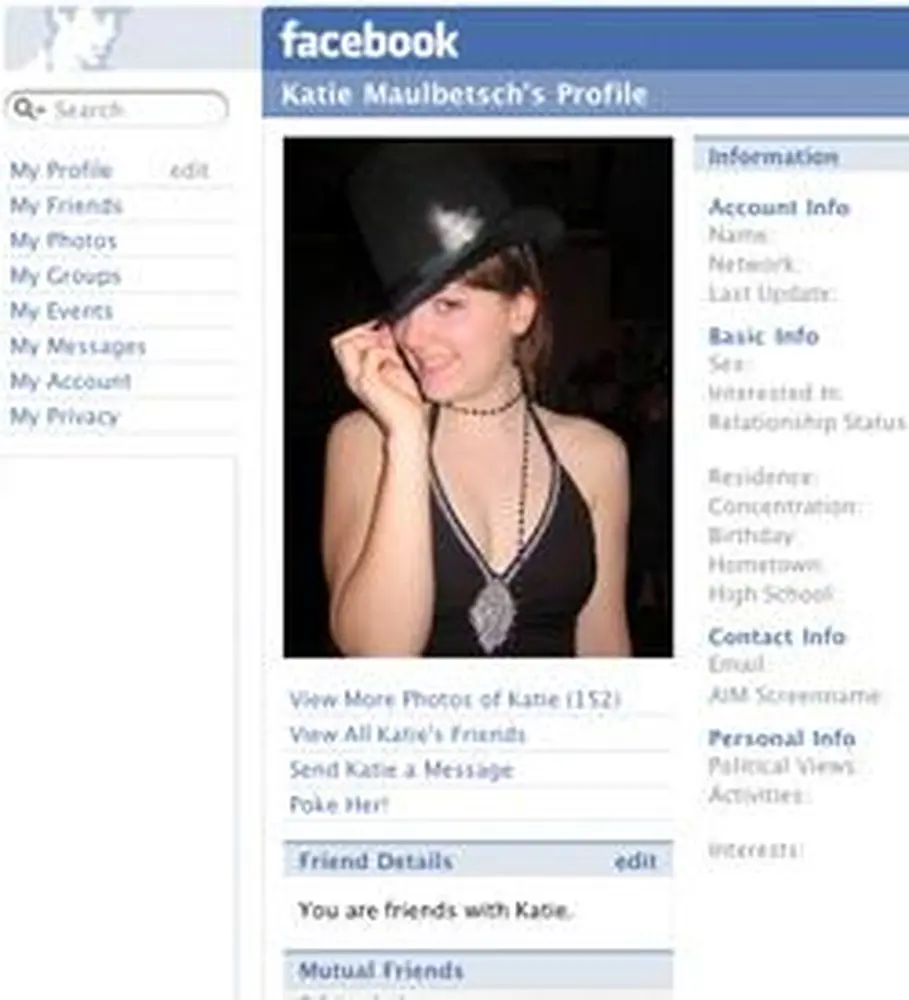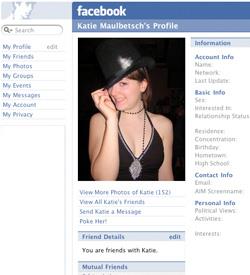

The blue-white glow of the computer reflects across Ashley Houtsma's face as she leans in towards the screen, scanning for any updates on her Facebook profile.
"It's like Christmas," says Houtsma, a senior in molecular and cellular biology, curled up in her black office chair. "Will there be a friend request? I don't know-better check!"
Not everyone takes such delight in Facebook.com as Houtsma, who checks her "profile" two to three times a day, but nearly all college students are familiar with this social networking phenomenon. The free service allows students to create a detailed personal profile, form groups around shared interests, post pictures, connect with long-lost buddies, and make new friends. With personal information instantly available, Facebook is changing the way students at the University of Illinois connect with one another.
If you walk through the halls of the dorms, past library study carrels, or into coffeehouses, you will see students logged onto Facebook, checking out the latest posting by a friend or looking up the girl or guy they met the previous night in a bar.
Lindsey Sieczko, a junior in psychology, takes Facebook breaks with her friends at work to gossip. "We gossip about what we find on it," says Sieczko, "and of course, we've already made a Facebook group about our job."
Karolina Wojcikowski, also a junior in molecular and cellular biology, uses Facebook to keep in touch with friends who are scattered around the country as well as to look up people in her classes. Because students can list their classes on Facebook, she can search for other students who are also registered for those same classes to find email addresses or learn more about the person who sits next to her every week.
In many cases, finding other students with similar interests doesn't even require searching. Any of the interests or groups students list on their profile is instantly linked with profiles of other students who list that activity or group. Thus, someone who lists Pride and Prejudice as their favorite book or rap and blues as their favorite music becomes part of a campuswide community that shares that interest. Students can send out hundreds of invitations to a party instantaneously or check to see what other parties are happening on campus. During the week preceding summer school-one of the quietest times of the year on campus-54 parties were listed on the Facebook for U. of I., though not all on campus. Posting their summer plans, and parties, on Facebook is one way students keep in touch over the break.
The ease of connectivity is Facebook's primary draw, but what also makes it irresistible is that every student is a star. Their profile is their advertisement. Not surprisingly, boasting is rampant as are photos-often hundreds per profile (and probably not the ones their parents would prefer). Popularity is gauged by the length of your "friends" list-the people who obtain your permission to have their names appear on your profile page, usually accompanied by a photo. Students will sometimes join interest groups in hopes of growing their list of friends. Appearing on other friends' lists also ups your status, especially if you are associated with a local celebrity. (Former Illini basketball star Dee Brown was reported to have the longest list of friends on campus.)
Seeing how deeply Facebook has ensconced itself into the social scene on campus, it is surprising to recall that it's only been in existance for two years. Facebook.com was conceived by Harvard undergrad Mark Zuckerberg to replace the paperback facebooks distributed to freshmen. The paper facebooks were intended as a social aid for the new class and contained basic information about each person, including a picture, major, birthday, and residence hall.
The interactivity of Zuckerberg's Web-based Facebook made it wildly popular, and it soon spread to Princeton. In February 2004, Facebook.com was launched to the public. Today 7.5 million people across the country are registered on one of its social networks. Recognizing the power of Facebook to reach students, large organizations as well as colleges and universities have begun posting ads. Units at the University of Illinois have posted "Facebook Flyers" on the U. of I. network to promote student programs and even a new library toolbar feature.
The uncensored nature of communication is part of what makes Facebook addictive and fun. But placing personal information in what amounts to a public space is not without dangers. Students are discovering that they can be suspended, arrested, or even denied jobs because of the information they post on a Facebook network. Contrary to what many of them believe, access is not restricted to students.
Anyone with a university email address can create a profile, at which point they may access Facebook profiles at that university. This means that administrators, staff, faculty, alumni, and even campus police have access to potentially damaging photos or posts. Students may block information from certain groups of people by using some of Facebook's privacy features. However, many students have not adopted these safety measures. (Nor do they prevent unwanted advances, a more immediate concern among students.)
According to USA Today, two swimmers at Louisiana State were kicked off the team in spring 2005 because of Facebook posts criticizing their coach. Police at Purdue University are reportedly being trained on how to use Facebook in order to track underage drinking at parties.
Similar crackdowns on underage drinking and other offenses because of information posted on Facebook have not been reported at the University of Illinois. Still, students are feeling the effects.
"One of my friends was applying for a job and they asked her about something that they had found on her Facebook profile during the interview," says Rose Porod, junior in molecular and cellular biology, whose friend could not share details because of a confidentiality agreement. "She ended up getting the job, but it definitely has made me more wary about posting something up I don't want people to see."
Wojcikowski eliminated her screen name for a while because of "creepy people" who were instant messaging her. Now she is more cautious about censoring her profile.
Despite the dangers of posting information online, the power of connecting with other students outweighs them.
"I don't put anything dangerous up there, like my address or anything," says Houtsma about whether she feels uncomfortable sharing so much information online. "And I like that people can get a peek at my life."


